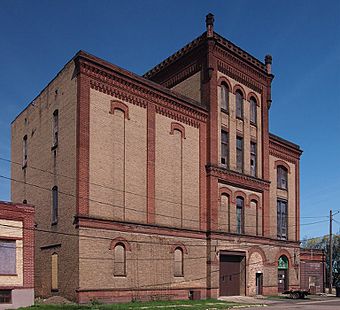Virginia Brewery facts for kids
Quick facts for kids |
|
|
Virginia Brewery
|
|

The Virginia Brewery viewed from the southeast
|
|
| Location | 305 S. 7th Avenue, Virginia, Minnesota |
|---|---|
| Area | Less than one acre |
| Built | 1905 |
| Architect | H. Eilenberger & Co. |
| Architectural style | Richardsonian Romanesque |
| NRHP reference No. | 80004363 |
| Added to NRHP | August 27, 1980 |
The Virginia Brewery was a building in Virginia, Minnesota, where beer was made a long time ago. It was built in 1905. This brewery, like many others, had to close during a time called Prohibition. This was when making and selling alcohol became illegal in the United States.
The building is now listed on the National Register of Historic Places. This means it's an important historical site. It was added to the list in 1980 because it shows us a lot about the architecture, business, and industry of its time.
The Virginia Brewery: A Look Back
The Virginia Brewery building is a special example of the many local breweries that used to exist. These breweries were very important to the towns in the Iron Range area. They helped the local economy and were a big part of social life. For example, some breweries would even help pay for local sports teams!
Why Was This Building Important?
The Virginia Brewery was a key part of its community before Prohibition. It helped create jobs and provided a product that people bought. It also showed how businesses worked in the early 1900s.
- Architecture: The building itself is a good example of a style called Richardsonian Romanesque. This style uses strong, heavy stone and brick, often with rounded arches.
- Commerce and Industry: The brewery was a business that made and sold products. It was part of the local industry, which means it helped the economy of Virginia, Minnesota.
What Happened to Breweries Like This?
Many small breweries, like the Virginia Brewery, faced two big challenges:
- Prohibition: This was a nationwide ban on alcohol from 1920 to 1933. It forced all breweries to close.
- Competition: Even after Prohibition ended, it was hard for small local breweries to compete with much larger beer companies. These bigger companies could make beer cheaper and sell it all over the country.
Because of these reasons, many local breweries, including the Virginia Brewery, eventually went out of business for good. The building remains as a reminder of this important part of history.



